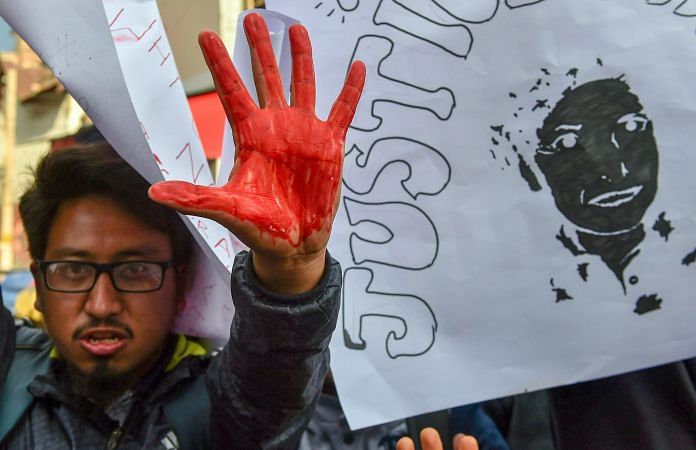New Delhi: Only about 36 per cent of the funds allocated for the Nirbhaya fund, launched in 2013 for schemes meant to enhance women’s safety in India, has been utilised over the past seven years, a parliamentary panel has noted.
The fund is named after the media moniker devised for the 23-year-old paramedic intern who was brutally raped, tortured and fatally injured by six men on a moving bus on 16 December 2012.
It was launched in the wake of the ghastly gangrape and murder amid anger around the country over what was seen as systemic indifference to crime against women. The Union Women & Child Development (WCD) Ministry serves as the nodal government arm for the fund.
However, the 31-member Standing Committee on Human Resource Development noted “underutilisation of the ‘Nirbhaya fund’” in its report to Parliament Thursday.
The report was placed in Parliament hours before four of the convicts involved in the crime (one died in 2013, while another is out after serving the three-year reform home stint laid down by India’s juvenile justice law) were hanged at Tihar Jail early Friday morning.
According to the panel, headed by BJP Rajya Sabha MP Satyanarayan Jatiya, “the pace of implementation of the projects funded from the Nirbhaya Fund is lethargic and needs to be fast-paced”.
The report, titled ‘Issues related to safety of women’, notes that “the total apportioned amount under the Nirbhaya Fund currently stood at Rs 7436.66 crore for 32 different projects/schemes across the country”.
“However, an amount of only Rs 2647.89 crore had been disbursed by the concerned ministries/departments for the various projects/schemes under the Nirbhaya Fund, which is on extremely low side,” the report adds.
ThePrint approached senior officials of the WCD by email for a response on the report, but hadn’t received replies by the time of publishing.
Also Read: Deny bail to those accused of heinous crimes like 2012 Delhi gangrape: Parliament panel
‘States not utilising funds’
The Nirbhaya fund is primarily meant to implement three initiatives through coordination between the WCD Ministry and the central government as well as state and union territory administrations: One-Stop Centres (OSC), Universalisation of Women Helpline (WHL), and Mahila Police Volunteers (MPV).
The OSCs are meant to help women who are victims of violence by providing a range of services such as police, medical aid, legal aid and counselling, and psychological support under one roof.
According to ministry data, as of June 2019, 617 OSCs operational in 35 states and UTs had provided assistance to over 2.27 lakh women.
The WHL scheme oversees a toll-free 24X7 helpline — available at 181 — for women seeking immediate support and information in cases of violence. As of June 2019, the helpline was operational in 32 states/UTs and had assisted over 38.62 lakh women.
The MPV scheme, implemented by the WCD Ministry in collaboration with the Ministry of Home Affairs, seeks to identify volunteers who can act as a link between police and society at large and help report incidents of violence against women. To date, a total of 13 states and UTs have furnished proposals and obtained approvals for the MPV scheme.
But the report notes that “many of the states have not yet utilised the total funds allocated to them under One Stop Centers (OSC), Women Helpline (WHL) schemes”.
“Only 20 to 30 per cent of the fund has been utilised by majority of the states,” the report adds.
“The low utilisation of these funds could be suggestive of the lack of a will to do something, that funds are not what is lacking in the fight for justice for women,” senior economist Reetika Khera told ThePrint.
“In the recent Hyderabad case (a dentist’s brutal rape and murder), we heard how police action was delayed — that suggests we need to work on educating the police force,” said Khera, who has studied the implementation of women-related schemes in the country.
“Tokenist measures such as the Nirbhaya fund, punitive measures such as the death penalty cannot solve this deeper social problem,” she added.
‘Ineffective coordination’
The parliamentary panel has recommended that a committee be formed under the cabinet secretary to oversee the status of implementation of projects and schemes under the Nirbhaya fund.
This committee, the report states, could help remove the hurdles that come into being “due to ineffective coordination between different ministries and state governments”.
It also recommends that the WCD Ministry organise “direct meetings with the state governments and UT administration quarterly to monitor the expenditure of funds” on the schemes.
Also Read: Art, life and Bollywood’s role in violence against women




this problem is easy to solve, but we need individuals to work on the scheme and help women be trapped from crime and not address afterwards , if possible give me this project i will implemnt it 98303 79639